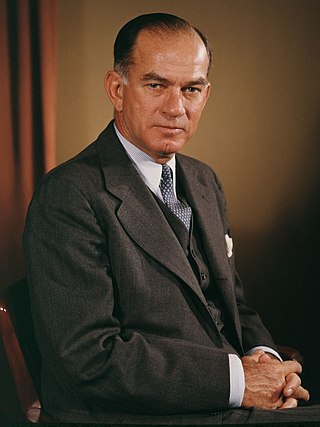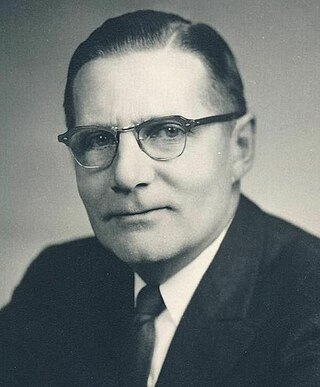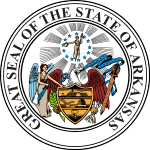
James William Fulbright was an American politician, academic, and statesman who represented Arkansas in the United States Senate from 1945 until his resignation in 1974. As of 2023, Fulbright is the longest serving chairman in the history of the United States Senate Committee on Foreign Relations. He is best known for his strong multilateralist positions on international issues, opposition to American involvement in the Vietnam War, and the creation of the international fellowship program bearing his name, the Fulbright Program.

The 1974 United States Senate elections were held on November 5, with the 34 seats of Class 3 contested in regular elections. They occurred in the wake of the Watergate scandal, Richard M. Nixon's resignation from the presidency, and Gerald Ford's subsequent pardon of Nixon. Economic issues, specifically inflation and stagnation, were also a factor that contributed to Republican losses. As an immediate result of the November 1974 elections, Democrats made a net gain of three seats from the Republicans, as they defeated Republican incumbents in Colorado and Kentucky and picked up open seats in Florida and Vermont, while Republicans won the open seat in Nevada. Following the elections, at the beginning of the 94th U.S. Congress, the Democratic caucus controlled 60 seats, and the Republican caucus controlled 38 seats.

The 1964 United States Senate elections were held on November 3. The 33 seats of Class 1 were contested in regular elections. Special elections were also held to fill vacancies. They coincided with the election of President Lyndon B. Johnson by an overwhelming majority, to a full term. His Democratic Party picked up a net two seats from the Republicans. As of 2023, this was the last time either party has had a two-thirds majority in the Senate, which allowed the Senate Democrats to override a veto, propose constitutional amendments, or convict and expel certain officials without any votes from Senate Republicans. However, internal divisions would have prevented the Democrats from having done so. The Senate election cycle coincided with Democratic gains in the House in the same year.

The 1962 United States Senate elections was an election for the United States Senate. Held on November 6, the 34 seats of Class 3 were contested in regular elections. Special elections were also held to fill vacancies. They occurred in the middle of President John F. Kennedy's term. His Democratic Party made a net gain of four seats from the Republicans, increasing their control of the Senate to 68–32. However, this was reduced to 67–33 between the election and the next Congress, as on November 18, 1962, Democrat Dennis Chávez, who was not up for election that year, died. He was replaced on November 30, 1962, by Republican appointee Edwin L. Mechem. Additionally, Democrat Strom Thurmond became a Republican in 1964, further reducing Democrats to 66–34. This was the first time since 1932 that Democrats gained seats in this class of Senators.

The 1960 United States Senate elections coincided with the election of John F. Kennedy as president on November 8, 1960. The 33 seats of Class 2 were contested in regular elections. A special election was also held on June 28, 1960, for a mid-term vacancy in North Dakota where Democrats flipped a seat to expand their majority to 66–34. As Majority Leader Lyndon Johnson was elected Vice President, Mike Mansfield became the new majority leader.

The 1958 United States Senate elections were elections for the United States Senate which occurred in the middle of President Dwight D. Eisenhower's second term. Thirty-two seats of Class 1 were contested in regular elections, the new state of Alaska held its first Senate elections for its Class 2 and 3 seats, and two special elections were held to fill vacancies.

The 1998 United States Senate election in Arkansas was held on November 3, 1998. Incumbent Democratic Senator Dale Bumpers chose to retire instead of running for reelection to a fifth term. Making this was the first open seat with no incumbent held in this seat since the 1884 election. Democratic former U.S. Representative Blanche Lincoln won the open seat against Republican State Senator Fay Boozman. At 38, Lincoln was the youngest woman ever elected to the United States Senate. In 2010, Lincoln lost re-election to a third term by Fay Boozman's younger brother John Boozman.

The 1938 United States Senate election in Arkansas took place on November 8, 1938. Incumbent Senator Hattie Caraway ran for a second term in office. After narrowly defeating U.S. Representative John Little McClellan in the Democratic primary, she easily won the general election over Republican C.D. Atkinson.

The 1944 United States Senate election in Arkansas took place on November 7, 1944. Incumbent Senator Hattie Caraway ran for a third term in office, but was eliminated in the Democratic primary. U.S. Representative J. William Fulbright defeated Governor Homer Martin Adkins in the Democratic runoff.

The 1932 United States Senate election in Arkansas took place on November 8, 1932. Incumbent Senator Hattie Caraway, who had been appointed to succeed her late husband Thaddeus Caraway in 1931 and won a special election to complete his term in January, ran for a full term in office.

The 1974 United States Senate election in Arkansas took place on November 5, 1974. Incumbent Democratic U.S. Senator J. William Fulbright ran for re-election to a sixth term in office, but was defeated in the Democratic primary by Governor of Arkansas Dale Bumpers. Bumpers won the general election easily.

The 1964 United States Senate election in Vermont took place on November 3, 1964. Incumbent Republican Winston L. Prouty successfully ran for re-election to another term in the United States Senate, defeating Democratic candidate Frederick J. Fayette.

The 1958 United States Senate election in Vermont took place on November 4, 1958. Incumbent Republican Ralph Flanders did not run for re-election to another term in the United States Senate. Republican candidate Winston L. Prouty defeated Democratic candidate Frederick J. Fayette to succeed him.

The 1956 United States Senate election in Washington was held on November 6, 1956. Incumbent Democratic U.S. Senator Warren Magnuson won a third term in office, defeating Republican nominee Arthur B. Langlie.

The 1956 United States Senate election in Arkansas took place on November 2, 1956. Incumbent Senator J. William Fulbright won a third term in office. Without a primary challenger to Fulbright, the election did not attract much attention, as the Democratic nomination was tantamount to victory in the South.

The 1968 Arkansas gubernatorial election was held on November 5, when incumbent Republican Winthrop Rockefeller defeated former Speaker of the Arkansas House of Representatives Marion Crank by a small margin. Rockefeller was first elected in 1966, and was the first Republican to hold the office since Reconstruction. This was the first time a Republican was re-elected as Governor of Arkansas.

The 1936 United States Senate election in Arkansas took place on November 3, 1936. Incumbent Democratic Senator and Senate Majority Leader Joseph T. Robinson was re-elected to a fifth term in office. He defeated two Democratic opponents in the primary election and then dispatched Republican G.C. Ledbetter in the general election.

The 1962 United States Senate election in Washington was held on November 6, 1962. Incumbent Democratic U.S. Senator Warren Magnuson won a fourth term in office, narrowly defeating Republican nominee Richard G. Christensen.

The 1968 United States Senate election in Arkansas was held on November 5, 1968.



















